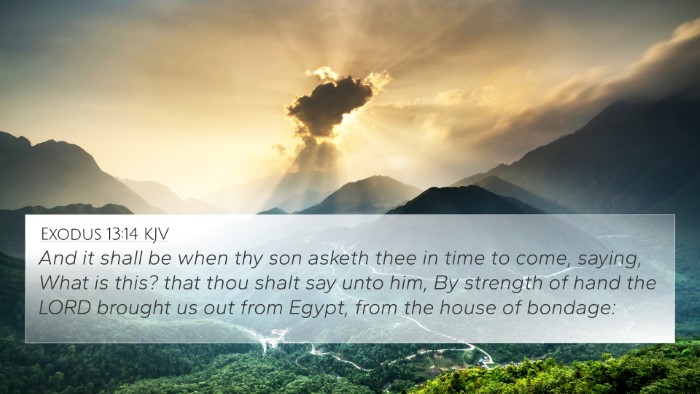Understanding Genesis 30:33
Genesis 30:33 states, "So shall my righteousness answer for me in time to come, when it shall come for my hire before thy face: every one that is not speckled and spotted among the goats, and brown among the sheep, that shall be counted stolen with me."
Summary of the Verse
This verse is part of the narrative involving Jacob, Laban, and the covenant concerning sheep and goats. At this point in the story, Jacob is negotiating the terms under which he will receive compensation for his work. He proposes that he will take only the animals that are speckled and spotted for himself, suggesting a clear demarcation for what will be considered fair earnings.
Commentary Insights
Matthew Henry Commentary
Matthew Henry emphasizes the importance of integrity and righteous dealings. He points out that Jacob is confident in his dealings and anticipates that his honesty will be vindicated in due time. The verse showcases Jacob's faith in God's provision and the notion that true righteousness will ultimately prevail.
Albert Barnes Commentary
Albert Barnes offers a perspective on the significance of the terms Jacob sets. He indicates that Jacob's careful selection of livestock symbolizes a deeper commitment to fairness and transparency in his relationship with Laban. This verse reflects the broader theme of God's justice and reward for one's diligence.
Adam Clarke Commentary
Adam Clarke notes that Jacob's declaration serves as a testimony of his transparent motives. Clarke elaborates on how Jacob's careful calculation reveals his insight into breeding and the genetic traits of the animals, indicating his intelligence and shrewdness in business, rooted in a faith that recognizes divine sovereignty over his affairs.
Key Themes and Connections
- Integrity in Business: Jacob’s insistence on clear terms reflects a moral principle that is applicable today.
- Divine Justice: The assurance that one's righteousness will speak for them points to eventual rewards for honest and upright behavior.
- Faith and Providence: Jacob’s confidence in God’s provision highlights the relationship between faith and practical actions in everyday life.
- Sovereignty of God: Despite Jacob’s cunning, the underlying message is that God controls outcomes, embodying His plans and purposes.
Cross-References and Related Verses
Genesis 30:33 connects deeply with several other Biblical passages, illustrating thematic and doctrinal parallels. Below are notable cross-references:
- Genesis 31:7: Jacob speaks of Laban’s deceptive practices, paralleling his own experiences of integrity.
- Proverbs 11:1: "A false balance is abomination to the Lord: but a just weight is his delight," which emphasizes fairness.
- Romans 2:6: “Who will render to every man according to his deeds,” which connects to the principle of righteous rewards.
- Galatians 6:7: "For whatsoever a man soweth, that shall he also reap," reinforcing the idea of integrity leading to reward.
- Colossians 3:23-24: “Whatsoever ye do, do it heartily,” speaks to working with integrity and faithfulness.
- Psalm 37:25: "I have been young, and now am old; yet have I not seen the righteous forsaken," affirming God's care for the righteous.
- Matthew 7:2: "For with what judgment ye judge, ye shall be judged," highlighting the importance of one's dealings with others.
Application and Practical Insights
Jacob's experience teaches valuable lessons about fair practices and integrity.
- Trust in God’s Timing: As seen in Jacob's life, being patient and trusting God's timing often yields better outcomes than immediate gratification.
- Maintain Ethical Standards: Being clear and ethical in dealings, as Jacob modeled, is essential in all aspects of life, including business.
- Faith in Action: Combine faith with practical wisdom, as Jacob did, to make decisions that reflect both trust and diligence.
Comprehensive Study Using Cross-References
For those studying the Bible, especially focusing on connections between verses, utilizing a Bible concordance or a Bible cross-reference guide enhances understanding significantly. By comparing Genesis 30:33 with other scriptures, one can uncover deeper insights about integrity, providence, and faith in both the Old and New Testaments.
In studying Genesis 30:33, it's insightful to ask what other verses relate to it, using methods of cross-referencing. This enriches one's interpretation and application of Biblical principles.
Conclusion
Genesis 30:33 serves as a crucial point in Jacob's journey, highlighting his principles of righteousness and divine trust. The intersection of integrity with God's providence is a central theme that informs one's spiritual walk today. By examining this text alongside others, believers can reveal profound truths and apply these lessons to their lives.








